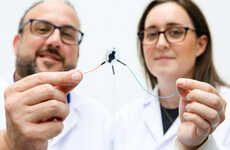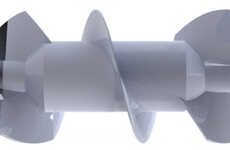
Researchers Develop World's First Implantable Artificial Kidney
Meghan Young — September 7, 2010 — Tech
References: sciencedaily & neatorama
Although people can survive and lead relatively normal lives with just one kidney, I can see the world's first implantable artificial kidney benefiting more than a few individuals. Considering that the organ donor list isn't as long as the donee list, I'm sure you won't disagree.
Developed by researchers at the University of California in San Francisco, this implantable artificial kidney "would include thousands of microscopic filters as well as a bioreactor to mimic the metabolic and water-balancing roles of a real kidney," according to Neatorama. Clinical trials are expected to begin in a few years.
Developed by researchers at the University of California in San Francisco, this implantable artificial kidney "would include thousands of microscopic filters as well as a bioreactor to mimic the metabolic and water-balancing roles of a real kidney," according to Neatorama. Clinical trials are expected to begin in a few years.
Trend Themes
1. Implantable Artificial Kidney - The development of an implantable artificial kidney presents a disruptive innovation opportunity in the field of organ transplantation, offering a potential solution to the shortage of organ donors.
2. Microscopic Filters - The use of thousands of microscopic filters in an artificial kidney opens up disruptive innovation opportunities in the medical device industry, leading to advancements in filtration technology for various applications.
3. Bioreactor Technology - The integration of a bioreactor in an artificial kidney creates disruptive innovation opportunities in biotechnology and pharmaceutical industries, enabling the development of advanced systems for metabolic and water-balancing processes in organ-like structures.
Industry Implications
1. Organ Transplantation - The development of an implantable artificial kidney has the potential to disrupt the organ transplantation industry, revolutionizing the way organ failure is treated.
2. Medical Devices - The use of microscopic filters in the artificial kidney presents disruptive innovation opportunities in the medical device industry, driving advancements in filtration technology for various medical applications.
3. Biotechnology - The integration of bioreactor technology in an artificial kidney opens up disruptive innovation opportunities in the biotechnology industry, enabling the development of advanced systems for organ-like structures with metabolic and water-balancing capabilities.
1
Score
Popularity
Activity
Freshness























